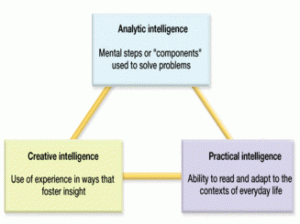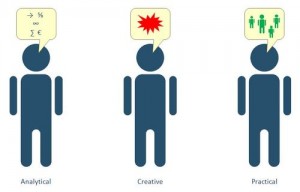Unfortunately for intelligence theorists, many of the great pioneers and thinkers that have contributed to the development of cognitive psychology are no longer alive today. If they were, we could clarify the various questions that trouble current theorists and gain some insight from them. However, there are a few exceptions to this. Robert J. Sternberg was born in 1949 and has made more recent contributions to intelligence theory. He is currently a professor at Cornell University (he also has honorary doctorates from thirteen universities in addition to many other awards and accolades). **Read more about Sternberg here.
Sternberg’s background in intelligence theory is in psychometrics, or the science of measuring mental capacities and processes. Traditionally, psychometrics provided the basis for standardized intelligence testing as we are familiar with it today. However, Sternberg’s stance on intelligence opposes many of the facets of psychometric views of intelligence. Standardized tests are supposed to measure “g:” the mental energy that underlies all cognitive tasks. If one scores well on one of these tests, the person is assumed to have a lot of “g;” they are intelligent. However, Sternberg feels that psychometric intelligence tests only measure analytical thinking and memory skills, and leaves out other essential components of intelligence. For example, psychometrics does not tell us how well someone works cooperatively, nor does it inform us of someone’s other skills and abilities.
Sternberg argues that we are able to predict people’s future academic performance from these tests because from the time they take it, if they do well, they receive “red carpet treatment” which enables them to succeed; whereas if they do poorly, they become convinced that they are not as smart and it becomes a self-fulfilling prophesy. In reality, the tests simply do not measure more than one or two facets of intelligence, so it alienates a lot of people.
From his points of dispute with psychometrics comes Sternberg’s Triarchic Theory of Intelligence. (**To learn more about Sternberg’s arrival at the Triarchic Theory and an additional explanation of it, click here.) The triarchic theory states that intelligence boils down to three fundamental components: analytical abilities, creative abilities, and practical abilities. Analytical ability is essentially critical thinking and problem-solving. It is what intelligence tests typically measure and thus what our current education system emphasizes and rewards. Creative ability is the capacity to generate new ideas and new ways to solve problems. Practical ability is one’s ability to understand what is needed in a given situation and respond effectively to the circumstances. To sum the three parts up, think of it like this: “You need creative intelligence to come up with an idea, analytical intelligence to know if it’s a good idea, and practical intelligence to sell it” (Sternberg).
So now that we understand what makes up the Triarchic Theory, what implications does it have or should it have for our education system? For one thing, I think it calls attention to a vast inconsistency in intelligence testing and its results: many people who scored poorly on these tests ended up doing very well in life and many people who performed well on the tests ended up leading relatively unsuccessful lives. We cannot overlook this discrepancy when these standardized tests (such as the SAT) are supposed to be reliable indicators of future success. Sternberg has offered his explanation of the inconsistency in scores and results in that “people who have superior practical and creative skills often do not perform well on tests that reflect only analytical abilities” (Sternberg).
The first implication of Sternberg’s theory is the way it could change intelligence testing. It is easier to add sections to intelligence tests that measure creative abilities than practical abilities because practical ability is, by nature, situated in a real-world context. In attempting to capture this and put it in a standardized test, it would be very difficult to avoid bias.
Another implication would be in the classroom. Right now, our education system places a lot of emphasis on math and science because those analytical abilities are what standardized tests draw on and therefore developing those helps us achieve better scores. However, in reality, isolated analytical abilities will not get one very far without the supplemental abilities to create and use ideas. So, we can encourage the development of creative and practical intelligences through our curriculum. If we also change the standardized tests, then we could not argue that spending time on creative and practical abilities is wasting time we could be spending preparing for the tests.



